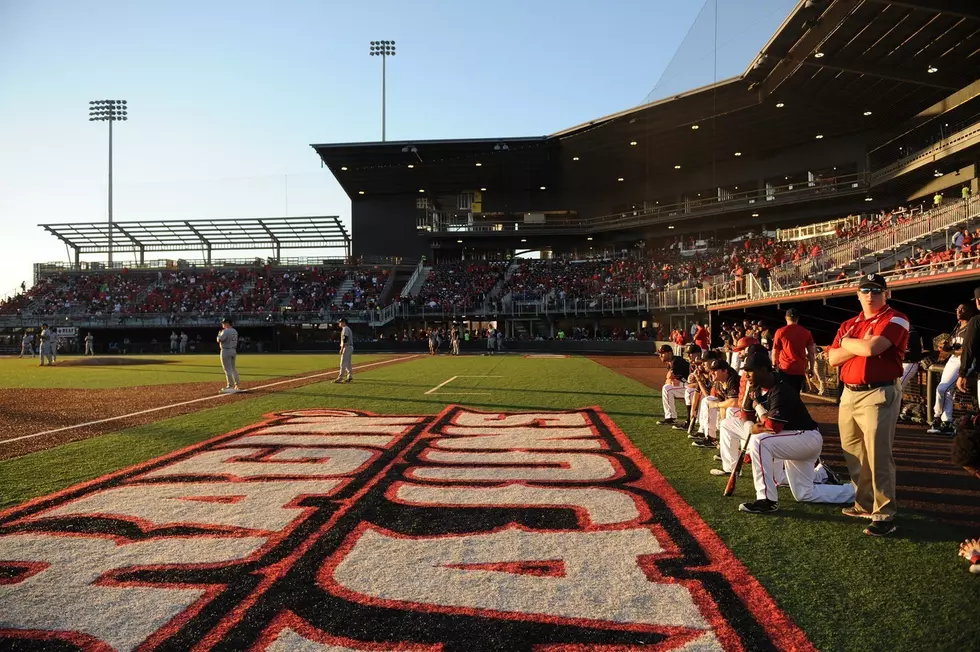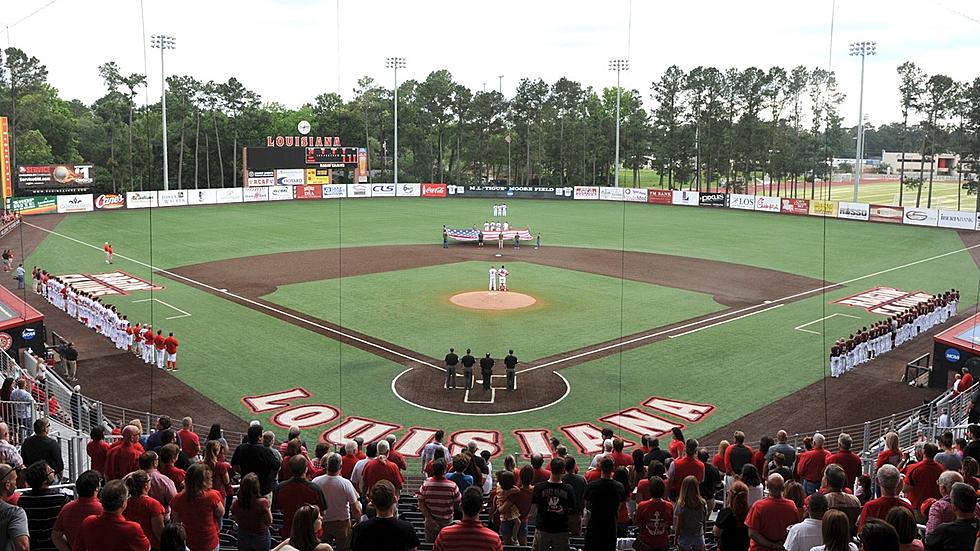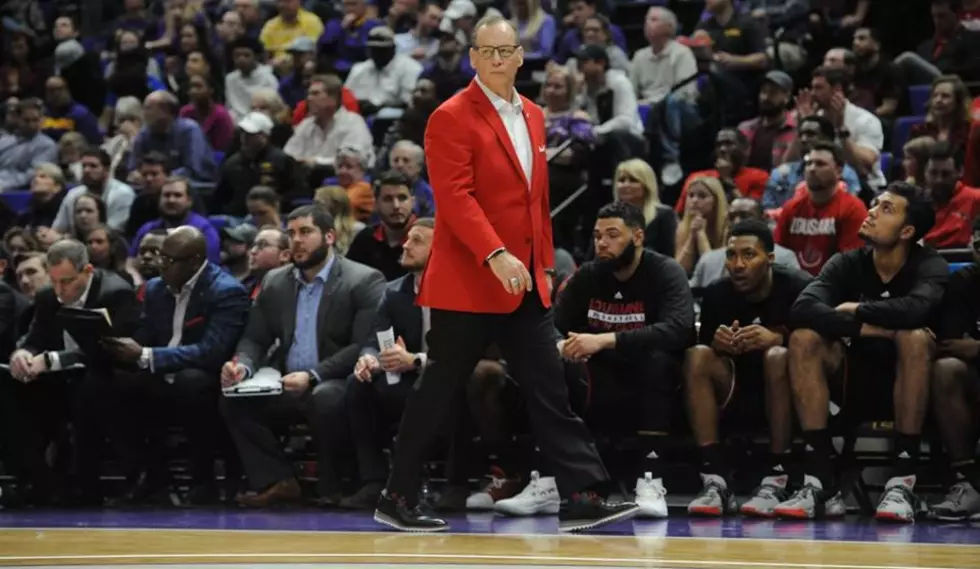
From the Bird’s Nest: Right man, right time
At the beginning, it was a job he really didn't want.
But in his 30-plus years of service to the University of Louisiana, David Walker had worn many hats. Now he was being asked to run athletics, a realm certainly out of his comfort zone.
In his catch-all title of Director of Auxilliary Services, Walker had some experience dealing with athletics. He was in charge of all contracts for the University. (President Dr. E. Joseph Savoie joked once that Walker had been practicing law without a license for years.) Among other contracts, Walker negotiated the broadcast contract for KPEL Radio. He also handled personnel discipline matters and that occasionally brought him to the forefront of athletics as well, especially the firing of former basketball coach Glynn Cyprien.
Walker preferred to stay in the background. Although he was an accomplished speaker, he didn't like speaking in public. He didn't like the limelight. He moved in the shadows and got things done.
Now he was being asked to head the department on an interim basis. And, this meant he would be more of a public figure than he ever imagined. He agreed to take the job.
Reluctantly.
He walked into a tough situation. Money was tight. No. Money was non-existant. Request after request for money from coaches and personnel were unilaterally refused.
And as a result, morale was pretty low.
Walker found out just how tough things were in his first ten minutes on the job. He walked into his new office and asked Athletics Secretary Karen Faber to bring him a legal pad and pen. She stammered. Walker asked what was wrong.
"Mr. David," she said, "we don't have any pads."
Walker immediately told her to make a list of office supplies that she needed to run the office. She did it....on a scrap piece of paper.
Welcome to the athletics department.
Walker issued an edict that all requests for funds be approved and sent to him for final approval. He couldn't always say yes. But more often than not, he did.
Where did the money come from?
Walker may not have known a great deal about athletics. But he knew contracts. He knew business.
And most importantly, he knew how to get the money.
When Walker was named as the interim athletics director, some fans raised an eyebrow. Walker had been entrenched at the University for over thirty years. He was a part of the "old brigade." He had worked side by side with then-President Dr. Ray Authement and then-Vice President Raymond Blanco.
And that made him the perfect choice for athletics. Walker, because he had the complete, unwavering trust of Authement, was given free reign over athletics. And, Walker knew that there had to be money available. Authement trusted him to spend it wisely.
And, immediately, attitudes around the department began to change.
Those who know David Walker will tell you he's a pretty no-nonsense guy. He's very direct. VERY direct. Everyone who worked with him always knew where they stood. And if you didn't, he was quick to let you know. The staff respected his no-b.s. attitude. He showed early he'd find a way to make it work. And the staff responded...with pride and a new-found pep in their step.
Then, one month on the job, Hurricane Katrina hit Louisiana. And, immediately, there were new challenges. The football schedule had to be redone to accomodate other teams in the league whose own schedules were directly affected by the storm. Negotiations began to move the New Orleans Bowl to Cajun Field. The Cajundome, which became a shelter for the displaced, was not going to be ready for the start of basketball season, necessitating an emergency facelift to Blackham Coliseum. Walker asked more of, not only his staff, but others at the University who were used to wearing more than one hat.
And, it all got done.
As he surveyed the department and talked to those who now called him "Boss," it became apparent to Walker that if the department was going to grow and have success on the field, changes needed to be made. Coaches were going to have to be put on more of a level playing field with other programs around the Sun Belt Conference. And, that wouldn't be easy with the second lowest budget in Division I-A (now Football Bowl Subdivision) athletics.
So he found more money.
One of Walker's first accomplishments dealt with student-athletes and summer school. University scholarships covered the fall and spring semester. Once the spring ended, students left. And, if they needed summer school to keep their eligibility, it came on their own nickel. And, with the new Academic Progress Rate (APR) criteria, UL was going to be in a bind. Walker found the money to fund summer school for student-athletes. It served a two-fold purpose. Now students could go to summer school if they needed the hours, or they could use summer school to get ahead. In addition, more student-athletes on campus meant that there was more team togetherness. Student-athletes could now work together in voluntary offseason workouts. And, that would make for better on-field performance. That may go down as Walker's most important achievement.
As a result, UL student athletes posted a 2.715 GPA in the Spring 2010 semester, marking the 13th consecutive semester that UL's student athletes were 2.7 or higher.
In 2008-09, the Ragin' Cajuns APR score ranked in the top half of the Sun Belt Conference's nine football schools in ten different sports.
177 student-athletes posted a 3.0 GPA or higher in Fall, 2009. That's 47 percent of all student-athletes. That was up from 153 in fall 2008 and 153 in Spring 2008.
In 2007, Dr. Authement asked Walker to take over the position on a permanent basis. No more "interim" in the title. By this time Walker had become more comfortable in the position. He realized that he could accomplish things that, because of the trust he had with the President, no one else could accomplish. He still hated being in the spotlight. But he was a little less reluctant to say yes.
But, he insisted on a new athletics department position of Sr. Associate Director of Athletics. It was approved. He wasted no time in hiring Scott Farmer away from Troy University. Walker, during the interim, led the search for his replacement and was impressed with Farmer. In fact, if an AD had been hired back then, Farmer would have been Walker's recommendation. He believed that Farmer was the future of athletics at UL and wanted him close by to run the day to day operation. And, Farmer's outgoing personality would make him a perfect face for athletics, allowing Walker to stay more in the background.
As the CEO of the athletics department, anything that went wrong was ultimately laid at his feet, although he might not be directly to blame for the problem. And, if you accept that, then you must also accept that Walker deserves at least some credit for the progress made in athletics during the last five and a half years. Along with Farmer,
*- Walker was instrumental in changing the funding plan for athletics for state schools. Instead of a flat funding figure for athletics, schools are now allowed to use up to 3% of their total operating budget as state funding for athletics. That added a couple of million dollars to the athletics budget.
*-The weight room was completely remodled and equipment in the weight room was customized to help accomodate more student-athletes simultaneously.
*-Oversaw and negoatiated the "Partnership for Victory" between UL and Cox Communications, a ten year agreement to bring in over two million dollars to the athletics department.
*-Entered into an agreement with Russell Athletics to be the "Official team uniform and apparel outfitter" of Ragin' Cajun athletics through 2012.
*-The Construction of the Leon Moncla Indoor Practice Facility
*-A 2.1 million dollar upgrade to Lamson Park
*-Installation of ProGrass Turf at Cajun Field and M. L. "Tigue" Moore Field
*-Planned renovations to the Track/Soccer Complex
*-Planned renovations to M. L. "Tigue" Moore Field
*-Artist renderings for renovations to Cajun Field
*-Helped to oversee the formation of the Ragin' Cajun Athletics Foundation (RCAF)
It's hard to believe that all that was accomplished in 5 1/2 years.
In additon, Walker was part of the interview process that brought basketball coach Bob Marlin and football coach Mark Hudspeth to Lafayette. His hiring of Heather Mazeitis as volleyball coach reaped benefits as UL volleyball had their best season in nearly a decade in 2010. Soccer had its first winning season ever in 2007 and set a school record for wins in 2010. His hiring of Theo Sliman to head the golf program resulted in UL having 11 Top 10 finishes in 12 tournaments in Sliman's rookie year of 2008-09. Included were nine top-five finishes and two first place finishes.
Not everything Walker touched turned to gold, however. Women's basketball has struggled since the 2007 season and Walker is the first to say that the hiring of Steve Silvey to coach track and field was probably his biggest mistake in personnel. However, He hired Charlie Mahfouz to replace Silvey and Mahfouz was named Men's indoor track Coach of the Year in 2010.
Walker found a way to increase budgets for already existing coaches, and as a result, UL football tied for the Sun Belt Championship in 2005 and were bowl eligible in 2005, 20o6, 2008 and 2009. Baseball and softball continued to flourish. And Walker put both McNeese State and Southern University on the football schedule, resulting in two of the top five attendance marks in Cajun Field history, including 41,357 for Southern in the 2009 season opener. Walker also negotiated contracts to bring Big XII members Oklahoma State and Kansas State to Cajun Field.
But then, there was Louisiana Tech.
A couple of years ago, Scott Farmer received an email from then-Tech Associate AD Bruce Van de Velde. (Van de Velde was named permanent AD when Head Coach/Athletics Director Derek Dooley was named football coach at Tennessee.) The email, which obviously had been sent to other schools as well, stated that Tech was interested in entering into a home-and-home scheduling agreement for football. Farmer returned the call and was shocked at what Van de Velde had to say.
Not interested.
Van de Velde went on to say Louisiana Tech owned recruiting in the state, was about to get into Conference USA and said Tech would gain nothing by playing Louisiana.
Farmer reported the conversation to Walker, who was incensed. So incensed that he didn't pick up the phone that day.
He also didn't sleep much that night.
The next morning, Walker asked Farmer to repeat the gist of the conversation. He then went to his office to call Van de Velde who told Walker essentially the same thing he had said to Farmer the day before.
And Walker, very quietly, told Van de Velde that any signed contracts for competition between the two schools would be honored. But unless and until an agreement was in place to play a home-and-home series in football, with the series beginning at Cajun Field, that there would be no future scheduling agreements in any sports.
And he hung up the phone.
After a period of time, Van de Velde called again and the two schools agreed to schedule two games in football, with the first at Cajun Field. Walker had the contracts drawn up and sent to Ruston.
Immediately, coaches at Tech started calling UL coaches to schedule games. Walker stopped those conversations dead in their tracks.
There would be no scheduling until signed contracts for the football series were received from Louisiana Tech. The signed contracts never arrived.
More scheduling agreements were made over the next couple of years. UL is still waiting for signed contracts.
And Tech coaches are still waiting for scheduling agreements. In baseball. In softball. In volleyball. In men's basketball. In women's basketball. And every other sport that UL sponsors.
When Walker announced in early October that he would retire, it was done with a simple press release from the Sports Information Department. None of the achievements under Walker's administration were mentioned, at his request. But the staff wanted to find a way to honor him. So, in a staff meeting the week before the home finale against Florida International, game management told Walker he would need to go on the field just before the game started for a presentation to outgoing Director of Sports Medicine John Porche.
"Y'all must think I'm stupid," Walker told them, seeing through the ruse.
He refused requests for interviews about his retirement and accomplishments. He would not allow the University to issue a press release when it was time for him to leave, which undoubtedly would have contained the accomplishments listed in this story. And, you may notice, there are no quotes from Walker here as well. There is no way he would have cooperated. In fact, he probably won't be happy if and when he reads this.
But sometimes, as the old cliche goes, it's better to ask forgiveness than ask permission.
I learned that. From David Walker.
More From 103.3 The GOAT




![LISTEN: Ragin’ Cajun Baseball Winning Call from Sun Belt Championship [Audio]](http://townsquare.media/site/37/files/2022/05/attachment-UL_20220529-8_7146-AJH.jpg?w=980&q=75)




